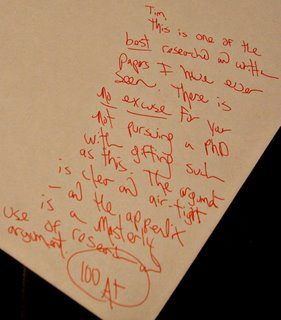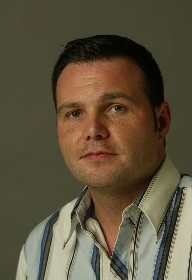This is my final post about Billy Graham and inclusivism (actually, I had not planned on writing any of these until I heard of his letter to the editor). I hope that these books, essays, and articles will be helpful in directing you to resources for your personal study. Admittedly so, whenever categories are provided, some level of subjectivity is determinative pertaining to what group I put the work in. Furthermore, some are not in either category because they have either gone both ways or cannot be easily categorized (Millard Erickson and Alister McGrath for example). Anyway, here it is. I will be adding this to my bibliography sidebar (to the right). Enjoy.
For Inclusivism:
Braaten, Carl E. No Other Gospel! Christianity Among the World’s Religions. Minneapolis: Augsburg Fortress, 1992.
Cobb, John B., and Clark H. Pinnock. Searching for an Adequate God: A Dialogue Between Process and Free Will Theists. Cambridge: Eerdmans, 2000.
Dupuis, Jacques. Toward a Christian Theology of Religious Pluralism. Maryknoll, NY: Orbis, 1997.
Edwards, David L. and John R.W. Stott. Essentials: A Liberal-Evangelical Dialogue. London: Hodder & Stoughton, 1988.
Grenz, Stanley J. Renewing the Center: Evangelical Theology in a Post-Theological Era. Grand Rapids: Baker, 2000.
Kung, Hans. Christianity & World Religions: Paths of Dialogue with Islam, Hinduism, and Buddhism. Maryknoll, NY: Orbis, 1993.
_________. “The World Religions in God’s Plan of Salvation.” In Christian Revelation and World Religions. ed. Josef Neuner. London: Burns & Oates, 1967.
Kung, Hans, and Jurgen Moltman, eds. Christianity Among World Religions. Edinburgh: T & T Clark, 1986.
Lewis, C.S. Mere Christianity. New York: Touchstone, 1996.
Lindbeck, George. The Nature of Doctrine: Religion and Theology in a Postliberal Age. Philadelphia: Westminster Press, 1984.
McDermott, Gerald R. Can Evangelicals Learn from Other World Religions? Downer’s Grove, IL: InterVarsity, 2000.
Pannenberg, Wolfhart. “The Reality of God and the Gods in the Experience of Religions.” In vol. 1 of Systematic Theology. Grand Rapids: Eerdmans, 1991.
Pinnock, Clark H. A Wideness in God’s Mercy: The Finality of Jesus Christ in a World of Religions. Grand Rapids: Zondervan, 1992.
_________. “Acts 4:12: No Other Name Under Heaven” in Through No Fault of Their Own?: The Fate of Those Who Have Never Heard. eds. William V. Crockett and James G. Sigountos, 107-15. Grand Rapids: Baker, 1991.
Punt, Neal. Unconditional Good News: Toward an Understanding of Biblical Universalism. Grand Rapids: Eerdmans, 1980.
Race, Alan. Christians and Religious Pluralism: Patterns in the Christian Theology of Religions. London: SCM Press, 1983.
Rahner, Karl. Theological Investigations vol. 5: Later Writings. London: Darton, Longman and Todd, 1965.
_________. “Anonymous Christianity and the Missionary Task of the Church.” In vol. 12 of Theological Investigations. Maryknoll, NY: Orbis, 1982.
_________. “Anonymous Christians.” In vol. 6 of Theological Investigations. Baltimore: Helicon, 1969.
_________. “Jesus Christ in the Non-Christian Religions.” In vol. 17 of Theological Investigations. New York: Crossroad, 1981.
_________. “Observations on the Problem of the ‘Anonymous Christian.’” In vol. 10 of Theological Investigations. New York: Seabury, 1976.
_________. “On the Importance of the Non-Christian Religions for Salvation.” In vol. 18 of Theological Investigations. London: Darton, Longman & Todd, 1983.
_________. “The One Christ and the Universality of Salvation.” In vol. 16. of Theological Investigations. New York: Crossroad, 1983.
Sanders, John. No Other Name: An Investigation into the Destiny of the Unevangelized. Grand Rapids: Eerdmans, 1992.
_________., ed. What About Those Who Have Never Heard? Three Views on the Destiny of the Unevangelized. Downers Grove, IL: InterVarsity, 1995.
Stackhouse, John G., ed. No Other Gods Before Me? Evangelicals and the Challenge of World Religions. Grand Rapids: Baker, 2001.
Stott, John R.W. The Contemporary Christian: Applying God’s Word to Today’s World. Downer’s Grove, IL: InterVarsity, 1992.
Tiessen, Terrance L. Irenaeus on the Salvation of the Unevangelized. Landham, MD: Scarecrow, 1993.
_________. Who Can Be Saved? Reassessing Salvation in Christ and World Religions. Downer’s Grove, IL: InterVarsity, 2004.
Wright, Chris. The Uniqueness of Jesus. Grand Rapids: Monarch Books, 2001.
Yong, Amos. Beyond the Impasse: Toward a Pneumatological Theology of Religions. Grand Rapids: Baker, 2003.
Articles for Inclusivism:
D’Costa, Gavin. “Karl Rahner’s Anonymous Christian—A Reappraisal.” Modern Theology 1/2 (January 1985): 131-48.
Fudge, Edward. “How Wide Is God’s Mercy?” Christianity Today 36 (April 27, 1992): 30-33.
Grenz, Stanley J. “Commitment and Dialogue: Pannenberg on Christianity and the Religions.” Journal of Ecumenical Studies 26 (Winter 1989): 196-210.
_________. “Toward an Evangelical Theology of Religions.” Journal of Ecumenical Studies 31 (Winter-Spring 1995): 49-65.
Osburn, Evert D. “Those Who Have Never Heard: Have They No Hope?” Journal of the Evangelical Theological Society 32/3 (September 1989): 367-72.
Yong, Amos. “Whither Theological Inclusivism? The Development and Critique of an Evangelical Theology of Religions.” Evangelical Quarterly 71/4 (October 1999): 349-57.
Pinnock, Clark H. “Toward An Evangelical Theology of Religions.” Journal of the Evangelical Theological Society 33/3 (September 1990): 359-68.
_________ “Why Is Jesus the Only Way?: No Other Way, Truth or Life Open to God.” Eternity 27/12 (1976): 12-34.
Sanders, John. “Is Belief in Christ Necessary for Salvation?” Evangelical Quarterly 60 (July 1988): 241-59.
Books/Essays Against Inclusivism:
Carson, D.A. The Gagging of God: Christianity Confronts Pluralism. Grand Rapids: Zondervan, 1996.
Fernando, Ajith. The Supremacy of Christ. Wheaton, IL: Crossway, 1995.
Geivett, R. Douglass and Clark Pinnock. “‘Misgivings’ and ‘Openness’: A Dialogue on Inclusivism Between R. Douglass Geivett and Clark Pinnock.” In Who Will Be Saved?: Defending the Biblical Understanding of God, Salvation, & Evangelism. edited by Paul R. House and Gregory A. Thornbury, 111-28. Wheaton, IL: Crossway, 2000.
Henry, Carl F.H. “Is It Fair?” in Through No Fault of Their Own? The Fate of Those Who Have Never Heard. eds. William V. Crockett and James G. Sigountos, 245-56. Grand Rapids: Baker, 1991.
House, Paul R. and Gregory A. Thornbury eds. Who Will Be Saved?: Defending the Biblical Understanding of God, Salvation, and Evangelism. Wheaton, IL: Crossway, 2000.
House, Paul R, Timothy George, Carl F.H. Henry, D.A. Carson, Scott Hafemann, and C. Ben Mitchell. “Forum Discussion on Inclusivism.” In Who Will Be Saved?: Defending the Biblical Understanding of God, Salvation, & Evangelism. edited by Paul R. House and Gregory A. Thornbury, 145-62. Wheaton, IL: Crossway, 2000.
Moo, Douglas. “Romans 2: Saved Apart from the Gospel?” in Through No Fault of Their Own?: The Fate of Those Who Have Never Heard. eds. William V. Crockett and James G. Sigountos, 137-45. Grand Rapids: Baker, 1991.
Nash, Ronald H. Is Jesus the Only Savior? Grand Rapids: Zondervan, 1994.
Noll, Mark A. and David F. Wells. Christian Faith and Practice in the Modern World: Theology from an Evangelist Point of View. Grand Rapids: Eerdmans, 1988.
Okholm, Dennis L. and Timothy R. Phillips, eds. Four Views on Salvation in a Pluralistic World. Grand Rapids: Zondervan, 1995.
Piper, John. Let the Nations Be Glad!: The Supremacy of God in Missions. Grand Rapids: Baker, 1993.
Plantinga, Alvin. “A Defense of Religious Exclusivism,” in Philosophy of Religion: An Anthology, 2nd ed. Louis Pojman ed. Belmont, CA: Wadsworth, 1994. 528-44.
Ramesh, Richard P. The Population of Heaven. Chicago: Moody Press, 1994.
Ryken, Phillip Graham. Is Jesus the Only Way? Wheaton, IL: Crossway, 1999.
Sanders, J. Oswald. What of the Unevangelized? Ross-shire, UK: Christian Focus Publications, 1999.
Strange, Daniel. The Possibility of Salvation Among the Unevangelized: An Analysis of Inclusivism in Recent Evangelical Theology. Carlisle, UK: Paternoster Press, 2002.
Other Books:
Bavinck, J.H. The Church Between the Temple and Mosque: A Study of the Relationship Between the Christian Faith and Other Religions. Grand Rapids: Eerdmans, 1966.
Crockett, William V. and James G. Sigountos, eds. Through No Fault of Their Own? The Fate of Those Who Have Never Heard. Grand Rapids: Baker, 1991.
Erickson, Millard J. How Shall They Be Saved? The Destiny of Those Who Do Not Hear of Jesus. Grand Rapids: Baker, 1996.
Jones, Hywel R. Only One Way: Do You Have to Believe in Christ to be Saved? Kent: Day One, 1996.
Jonsson, John H. Vatican II and World Religions. Louisville, KY: SBTS, 1986.
Karkkainen, Veli-Matti. An Introduction to the Theology of Religions: Biblical, Historical, & Contemporary Perspectives. Downer’s Grove, IL: InterVarsity, 2003.
Neill, Stephen. Christian Faith and Other Faiths: The Christian Dialogue with Other Religions. London: Oxford University Press, 1961.
Newbigin, Lesslie. The Gospel in a Pluralist Society. Grand Rapids: Eerdmans, 1991.
Shenk, Calvin E. Who Do You Say That I Am?: Christians Encounter Other Religions. Scottsdale, PA: Herald Press, 1997.
Other Articles:
Ashcraft, Morris. “The Finality of Christ and the World Religions.” Southwestern Journal of Theology 21/2 (Spring 1979): 23-39.
Blue, J. Ronald. “Untold Billions: Are They Really Lost?” Bibliotheca Sacra 138/52 (Oct-Dec 1981): 338-50.
Brown, Harold. “How Crowded Will Hell Be?” Christianity Today 36/10 (September 14, 1992): 39-40.
Campbell, Iain D. “The Possibility of Salvation Among the Unevangelized: An Analysis of Inclusivism in Recent Evangelical Theology.” Westminster Theological Journal 65/2 (Fall 2003): 390-92.
Erickson, Millard J. “Hope for Those Who Have Never Heard? Yes, But . . . .” Evangelical Missions Quarterly 11/2 (April 1975): 122.
_________. “The Destiny of the Unevangelised.” Bibliotheca Sacra. 152 (January-March 1995): 3-15; 152 (April-June 1995): 113-44; 152 (July-September 1995): 259-72.
Ferrante, Joseph. “The Final Destiny of Those Who Have Not Heard the Gospel.” Trinity Studies 1/1 (Fall 1971): 55-62.
McWilliams, Warren. “Spirit Christology and Inclusivism: Clark Pinnock’s Evangelical Theology of Religions.” Perspectives in Religious Studies 24 (Fall 1997): 325-36.
Reichenbach, Bruce R. “Inclusivism and the Atonement.” Faith and Philosophy 16/1 (January 1999): 43-54.
Richard, Ramesh P. “Soteriological Inclusivism and Dispensationalism.” Bibliotheca Sacra 151 (January-March 1994): 85-108.
Wright, Christopher J.H. “The Christian and Other Religions: The Biblical Evidence.” Themelios 9/2 (January 1984): 4-15.
Note: Future Bibliographies in the works include: Universalism and Hell, John Hick/Pluralism, David F. Wells, and Billy Graham's Theology of Evangelism and Conversion.














